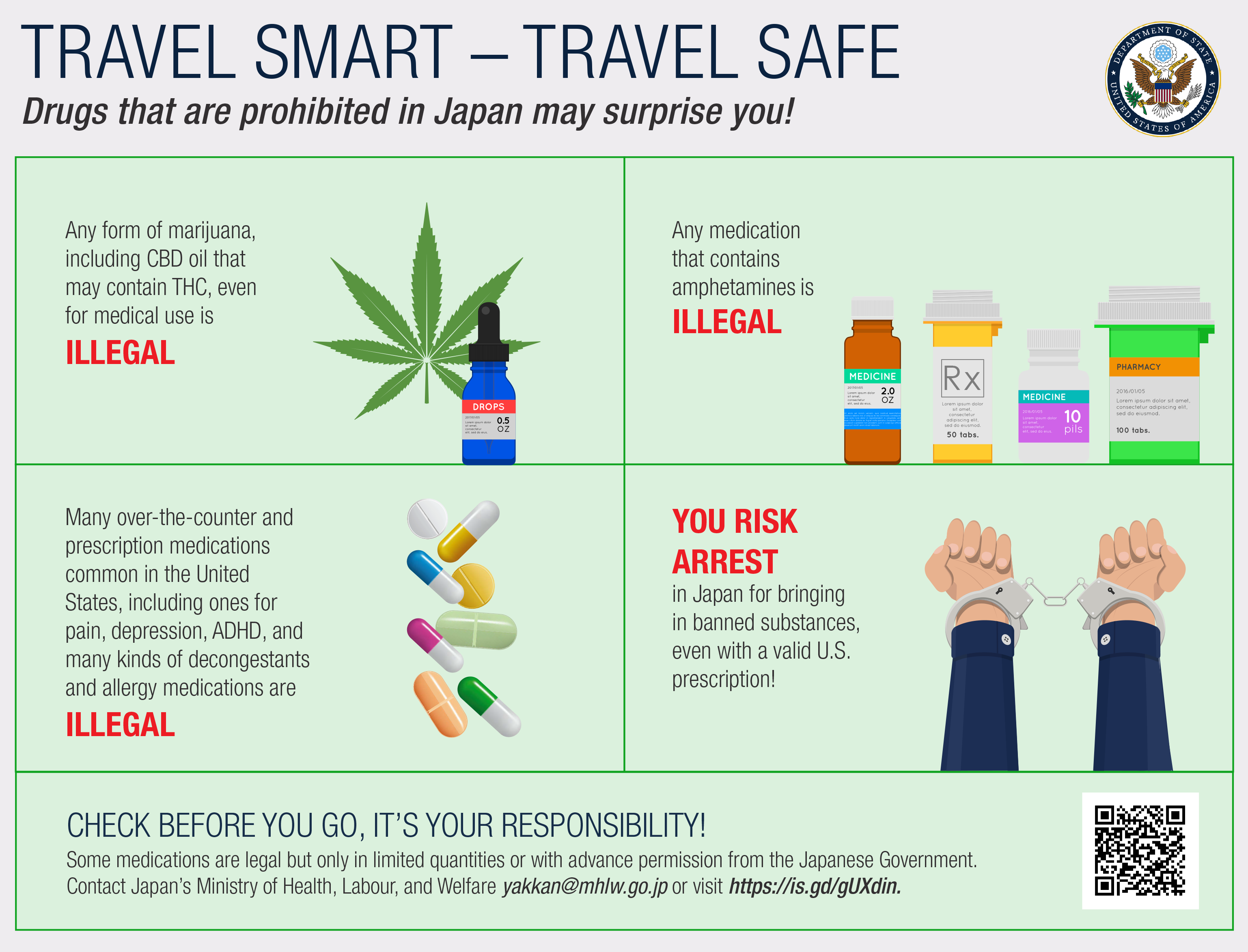Purpose

Introduction
There are multiple steps that travelers can take to be better prepared to travel with their medications. Some medications may be prohibited from being used or prescribed at the traveler's destination, while others may be restricted in the amounts or dosage forms that are permitted. Travel medicine specialists commonly care for travelers with complex medication regimens and are well versed in strategies and resources to minimize risk when traveling with multiple medications. A travel medicine specialist, or even a traveler's personal physician, can provide the traveler with a letter listing each medication (including generic name), dosing specifics, and indication (see Template Letter 1: Traveling Internationally with Medication(s), in the Appendix).
Commonly prohibited or restricted medications
Consequences for being caught traveling internationally with a prohibited or restricted medication include delay in travel, confiscation of the medication, denial of entry, or arrest. If a medication is on the Drug Enforcement Administration controlled substances schedule in the United States, a traveler or their healthcare professional should determine whether it is prohibited or restricted at an international destination. However, even if a medication is not controlled in the United States, it still may be prohibited in another country. A summary of the International Narcotics Control Board's (INCB's) most frequently listed medicines of concern can be found in Table 2.6.1. Medications to exercise particular caution with include narcotics, such as hydrocodone and oxycodone, and sedatives, such as alprazolam and diazepam. Even zolpidem, a medication commonly used to prevent jet lag, requires permission in some countries and is prohibited in others. Amphetamine/dextroamphetamine and (lis)dexamfetamine, stimulants used to treat attention deficit hyperactivity disorder, are considered illegal at some destinations. Pseudoephedrine, a medication found in medications to treat upper respiratory symptoms, may be converted into methamphetamine and is illegal in some countries. While some of these medications may be strictly prohibited, others may be allowed if permission is obtained prior to travel. Therefore, determining the requirements before travel is advisable.
If needles are required for administration of a medication, this may introduce additional scrutiny at the destination, which may be problematic for those carrying medications that are often strictly controlled, such as anabolic and androgenic steroids. While insulin needles and injectable epinephrine are not restricted for U.S. domestic travel, the U.S. Transportation Security Administration (TSA) recommends separating out these items for international travelers clearing customs. Medically necessary injectable substances (e.g., insulin or testosterone enanthate) should also be presented during the U.S. screening process. Although guidance is not available for most international destinations, travelers may benefit from having needle-related items ready to display if asked. Consider providing a doctor's note to international travelers who carry needle-containing supplies overseas (see Template Letter 1: Traveling Internationally with Medication).
International travelers with HIV should be aware of a handful of countries that forbid them from entering due to their status (see Travelers with HIV chapter). Although carrying antiretrovirals may not necessarily be illegal in these countries, it will indicate a person's status and may be grounds for expulsion.
Mifepristone, an antiprogestogen, is approved in many countries for emergency contraception and termination of pregnancy. Nevertheless, mifepristone is banned in some states in the United States as well as some foreign countries. Healthcare professionals should confirm local regulations before advising a patient to travel with this medication.
Although U.S. and international policies have become more lenient concerning the use of cannabidiol (CBD), a compound found in the cannabis plant, international travelers should be aware of local laws when packing CBD-containing products, including but not limited to gummies, lotions, oil, and vape cartridges. Often classified as an herbal supplement, CBD itself is not psychoactive but is still controlled in some countries. Even if CBD is legal in a country, a CBD-containing product may be illegal if it also contains tetrahydrocannabinol (THC), another compound found in the cannabis plant and the main psychoactive component of marijuana. For some countries, the percentage of THC in a CBD-containing product determines whether it is legal. International travelers returning to the United States should be aware of the TSA's online guidance, which states: "Marijuana and certain cannabis infused products, including some CBD oil, remain illegal under federal law except for products that contain no more than 0.3% THC oil on a dry weight basis or that are approved by the Food and Drug Administration." Because domestic and international laws are evolving, counsel travelers to remain up to date on regulations or avoid packing CBD-containing products altogether.
Even in international destinations where it is legal to use marijuana recreationally, importation restrictions may exist, or definitive guidance may be unclear. Prohibitions for other recreational drugs, such as heroin, lysergic acid diethylamide (LSD), and 3,4-methylenedioxymethamphetamine (MDMA or ecstasy), are often clearer and more prominent, and traveling with these substances should be avoided. Likewise, travelers should not return to the United States with illegal substances, regardless of their legality in the international destination where they were acquired (see Substance Use and Substance Use Disorders in Travelers chapter, for more information on this topic).
Table 2.6.1: Definitions of international narcotics control board terms and examples
| Term | Definition | Examples |
|---|---|---|
| Narcotic | Substance that dulls senses and relieves pain | Codeine, diamorphine, fentanyl, hydrocodone, methadone, morphine, oxycodone, tramadol |
| Psychotropic |
Substance that affects behavior, mood, thoughts, or perceptions. Classes include:
|
Alprazolam, clozapine, cocaine, diazepam, gabapentin, (lis)dexamphetamine, lorazepam, marijuana, methamphetamine, 3,4-methylenedioxymethamohetamine (MDMA; ecstasy), methylphenidate, nitrazepam, temazepam, zolpidem |
| Controlled substance (country specific) | Substance subject to abuse or precursors that can be used to make a narcotic or psychotropic medication; anabolic and androgenic steroids | Andralone, cannabidiol (CBD), ephedrine, nandrolone, pseudoephedrine, testosterone |
Informational resources
No single resource exists where an international traveler or travel medicine specialist can access information to determine whether a medication is prohibited or restricted at a destination, so checking multiple sources is advisable. The INCB website is dedicated to informing travelers of restrictions in countries throughout the world. This website focuses on narcotics and psychotropics (such as stimulants, sedatives, or hallucinogens) and countries' specific entry requirements. Included on the website are medications that are strictly prohibited and, for medications that are restricted but not prohibited, what paperwork is needed to enter a country. In some cases, this may be a certificate endorsed by the health authorities of the traveler's country of residence, and in other cases this may be a certificate issued by the destination country. The INCB website often provides an official contact in the destination country to answer specific medication questions that travelers may have. Because the website relies on country officials to complete and submit a questionnaire, information for a country could be outdated due to delays in reporting.
Travelers may also seek online guidance either from their country's government or the destination's government. For U.S. travelers, the U.S. Embassy website for the destination country may contain medication-specific warnings (Figure 2.6.1). Another U.S. Department of State online resource allows travelers to search by country for pre-travel advice, which sometimes includes medications that are prohibited or links to country-specific websites that contain more information. For specific questions, however, the traveler may have to contact a U.S. Embassy employee for an answer.
If a traveler's question is not addressed by the aforementioned websites, the International Pharmaceutical Federation (fip@fip.org), a Netherlands-based organization with a database of senior pharmacists, can sometimes facilitate communication by forwarding an inquiry from a traveler to the appropriate point of contact in the destination country's government.
Figure 2.6.1

Medical travel tips
Even when there are no legal concerns, a few tips can simplify international travel with medications (Table 2.6.2). Travelers should always keep medications in their original, labeled containers. Although people who take multiple medicines often rely on a daily pill organizer, these should be avoided because medications often cannot be easily identified. Avoid decanting medicine until after arrival. Carrying medications onto the plane, as opposed to checking them, not only minimizes the chances of the medications being lost, damaged, delayed, or stolen, but also ensures that the traveler will be present in case a potentially problematic medication is found. Transporting medication for persons other than accompanying family members or mailing medications to a destination is often illegal (because the action could be considered as importing or exporting and requires a specific license) and should be avoided. Travelers should be aware of the regulations not only at their final destination but also for any country where they are traveling through customs, such as during a layover. If a required medication is prohibited at a destination and permission cannot be obtained, then reconsidering travel to that destination may be the wisest course of action.
Even if a traveler is on a regimen of medicines that are not controlled or prohibited, creating a list of medications and associated medical conditions may be beneficial. Keeping such a list handy in a purse, wallet, or smartphone-accessible file permits easy access in case a traveler unexpectedly needs to visit an emergency room or medical clinic. If a traveler needs to obtain medications once they are at their foreign destination (see What to Do When Sick Abroad chapter), they should be aware that drug names and preparations may vary between countries and that counterfeit or substandard medications are prevalent in many international destinations, even in pharmacies. The U.S. Embassy, a trusted local doctor, the International Pharmaceutical Federation (fip@fip.org), or the International Society of Travel Medicine Global Travel Clinic Directory may be able to offer advice on which pharmacy to choose.
When refilling a medication, bringing the original labeled medication container and prescription will better enable the pharmacy to match the prior medication with what is available. Travelers should be aware that some over-the-counter medications in their home country may require a doctor's prescription at the destination.
Navigating the resources to ensure that medications are permitted in a foreign country may be daunting to some travelers, but a travel medicine specialist can provide reassurance or, if necessary, advice to prevent problems during travel or at the final destination.
Table 2.6.2: Tips for traveling internationally with medication
| Do | Do Not |
|---|---|
| Keep medications in original, labeled containers | Decant medications or place them in a pill organizer |
| Place medications in carry-on belongings | Place medications in checked luggage |
| Be aware of medication-related laws in the destination country | Transport medications for people besides yourself or co-traveling family |
| Be aware of medication-related laws in countries during transit | Mail medications to a destination |
| Be aware that medications may have different names internationally | Transport medications or substances for non-medical or recreational use |
- International Narcotics Control Board. Travelling internationally with medicines containing controlled substances. International Narcotics Control Board Website. https://www.incb.org/incb/en/travellers/index.html.
- International Pharmaceutical Federation. International pharmaceutical federation. https://www.fip.org.
- Transportation Security Administration. Security screening, what can I bring? https://www.tsa.gov/travel/security-screening/whatcanibring/all.
- U.S. Department of State, Bureau of Consular Affairs. International travel. https://travel.state.gov/content/travel/en/international-travel.html.
